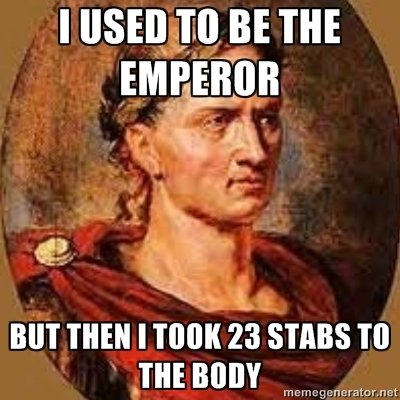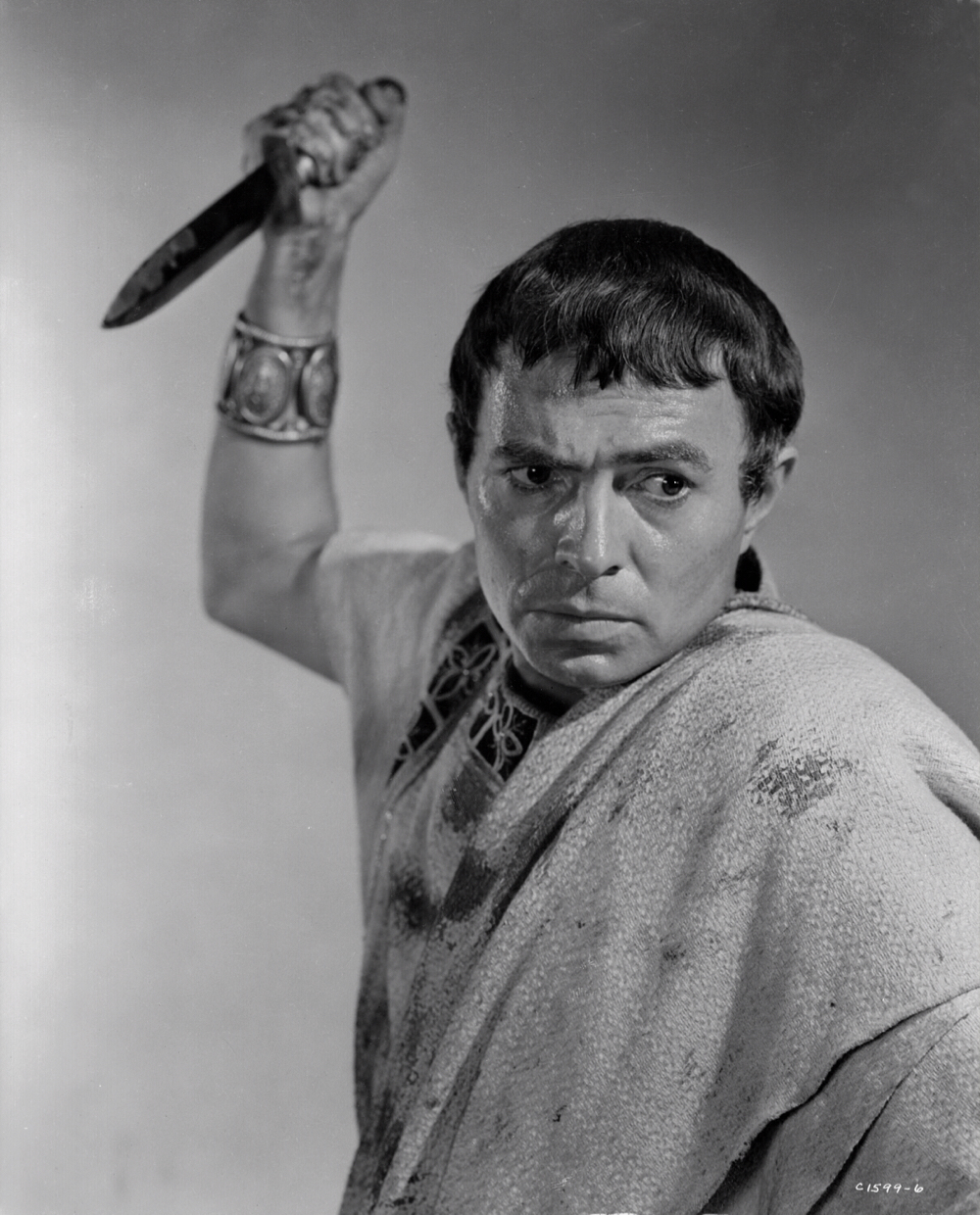Tuesday, March 20, 2018
The Fall of Caesar's Character
So after our discussion about the HBO series in class on Monday- and of course after reading the first two acts of the play- I started thinking about the potential differences between the show and the play. So to that end, my discussion question would have to be 'How similar or different are the show and the play?' for example, are the reasons for the assassination of Caesar as selfish and morally gray as they were in the tv show, or is he more of a clear villain? Or do they not adequately explain why he had to die? I think discussing this would help us gain more of an understanding of whether Caesar was truly an evil man, or if he suffered from the same defamation of character that Richard III did.
Monday, March 19, 2018
Family trust
Do Caesar’s family members trust his ability to rule or are they just waiting for home to make a mistake to tell him he’s not as invincible as he thinks?
Family Matters
Is Cassius responsible for turning Brutus on to the idea of murdering Caesar, or was Brutus' personal issues and family legacy a more prominent contributing factor to Brutus' role in the murder?


Sunday, March 18, 2018
Oh How The Powerful Have Fallen
In episode 12 of the HBO series, "Rome", Julius Caesar's reign falls because he started taking power away from the republic and taking it for his own, and in turn gets stabbed to death by many men, including Brutus. In this scene from MockingJay Part 2, Katniss decides to kill President Coin instead of President Snow because she realizes that Coin's true intentions are for herself and not for the people like she had initially promised. Therefore, she is just as bad as President Snow.
https://www.youtube.com/watch?v=xPug6IJSKXs
https://www.youtube.com/watch?v=xPug6IJSKXs
Merciful or Power Move
After watching episode 12, Kalends of February, I was left wondering if Brutus delivered the fatal stab to Caesar to put him out of his misery or to gain power in Rome?
The Anatomy of a Murderer
Upon watching the two episodes of Rome, I was surprised by the continual following and showing of Brutus's actions leading up to his betrayal of Caesar. I felt as if I were viewing a personal journey of his towards becoming a 'hero' of Rome, and that the show itself was trying to make its audience contemplate his and his allies actions versus Caesar. Servilia, Brutus's mother, was eerily snakelike and I found her to be almost insane, especially in the antagonistic relationship between her and her son and her alliance with Pompey's son.
It was interesting to see how Rome's interpretation of Caesar's life and death differed and converged from the other sources we were given (journal articles and Plutarch's stories). I particularly enjoyed picking out the inclusion of Brutus working with Pompey despite his role in the death of his father, and the inclusion of other characters mentioned in Plutarch's lives of Antony and Brutus. The scene where Brutus begs for Caesar to believe his innocence against the writing of the posted letter directly referenced the words of Plutarch, who implied that even in battle, Caesar did everything possible to spare Brutus. I felt Caesar's love for his friend consistent and human, despite Brutus's turmoil over what side he should choose.
Overall, I thought the show was a great way to visualize the events leading up to Caesar's death, as well as showcase the anger and conviction of his murderers. It seems to beg the question of the price of power, and the price of choice (characterized through Brutus's indecision and fear).
https://allhailtheblackmarket.com/wp-content/uploads/2017/03/070-james-mason-theredlist.jpg
It was interesting to see how Rome's interpretation of Caesar's life and death differed and converged from the other sources we were given (journal articles and Plutarch's stories). I particularly enjoyed picking out the inclusion of Brutus working with Pompey despite his role in the death of his father, and the inclusion of other characters mentioned in Plutarch's lives of Antony and Brutus. The scene where Brutus begs for Caesar to believe his innocence against the writing of the posted letter directly referenced the words of Plutarch, who implied that even in battle, Caesar did everything possible to spare Brutus. I felt Caesar's love for his friend consistent and human, despite Brutus's turmoil over what side he should choose.
Overall, I thought the show was a great way to visualize the events leading up to Caesar's death, as well as showcase the anger and conviction of his murderers. It seems to beg the question of the price of power, and the price of choice (characterized through Brutus's indecision and fear).
https://allhailtheblackmarket.com/wp-content/uploads/2017/03/070-james-mason-theredlist.jpg
Caesar's Death scene

https://www.hbo.com/rome/season-01/12-kalends-of-february
The betrayal of Caesar scene being acted out made it seem more plausible than reading it in an ancient text. It was interesting how Brutus and Antony were portrayed. They both had more emotion than what was mentioned by Plutarch. Brutus dropping the knife hinted at a sense of guilt at betraying Caesar. It really seemed like he was not going to take part in the murder which would have contradicted every record of the event. Instead he got the knife back in his hand and gave the final blow. It did not kill Caesar and Caesar did not deliver his famous lines. Caesars slow death was weird in that it made him into a mortal human being rather than an all powerful dictator/tyrant that would ruin everyone's lives.
Plutarch only mentioned Marc Antony being distracted by someone while the betrayal was happening but there were a couple of people distracted. Vorenus was taken out of the picture before entering the building and then as the chaos was unfolding Posca was clubbed in the head. A lot happened and it all happened fairly according to plan. The realism was further enhanced when one of the betrayers fell to the ground, succumbing to his wounds from friendly fire, as Caesar was still being stabbed. Plutarch mentioned something similar in his text.
The way the plan was enacted looked more sloppy than it sounded like it should have gone. The guy who grabbed at Caesar first did not stab him and had to yell “Now” a bunch of times. There was a lot of hesitation from everyone involved because no one wanted to be the first one. That sort of hesitation happens nowadays but with less betrayal and blood. It was weird that even though this significant event was happening nobody knew about it except the ones doing the murdering and to everyone else it was just another day, as can be seen when comparing what was happening to Caesar with Vorenus’ and Pullo’s side stories.
Subscribe to:
Comments (Atom)

